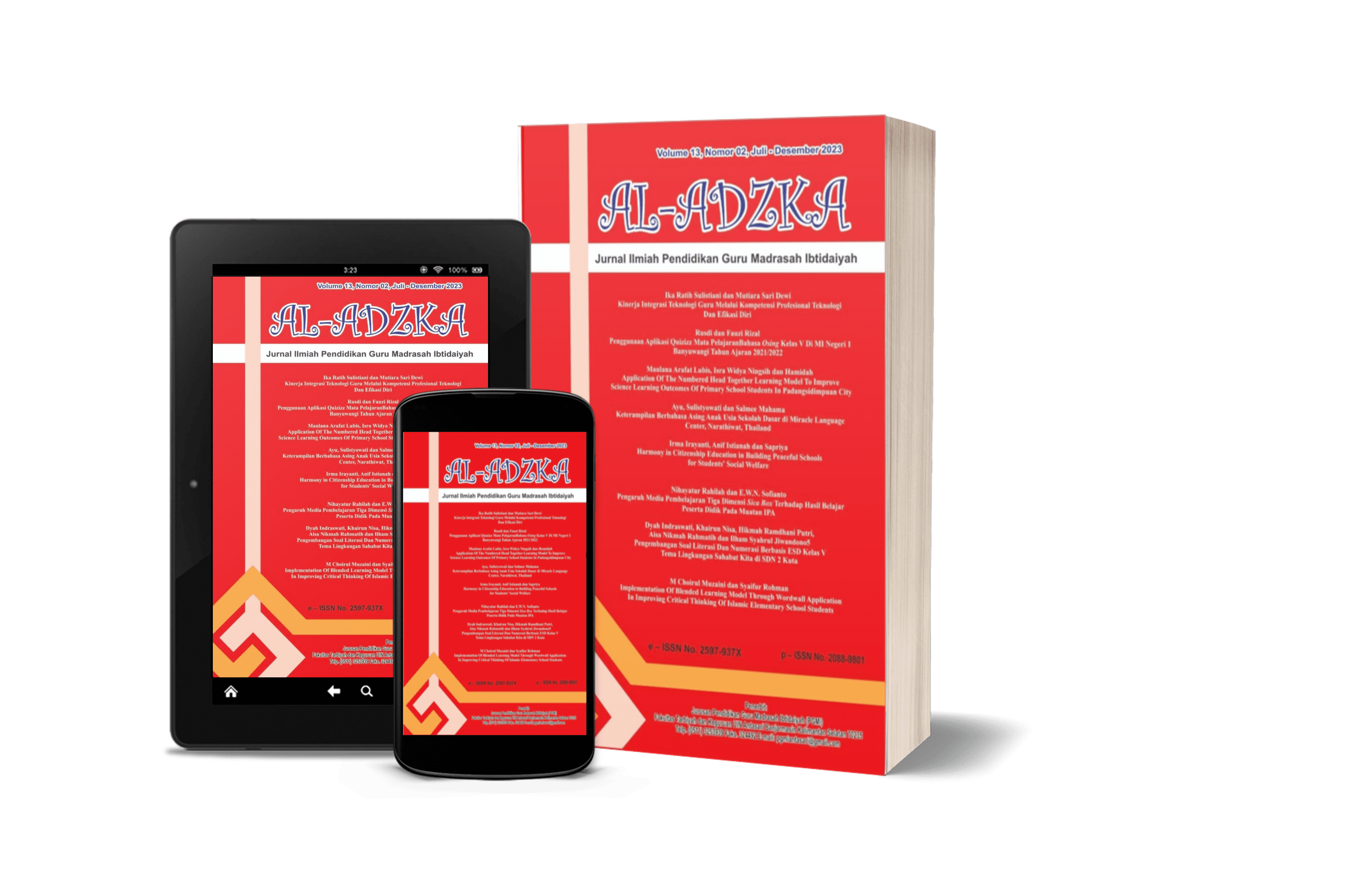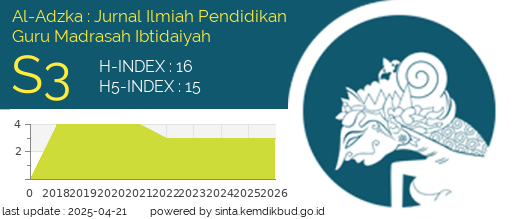Problem-Based Learning: Alternative Learning Model to Improve Students’ Critical Thinking Ability
DOI:
https://doi.org/10.18592/aladzkapgmi.v11i2.5012Abstract
The goal of this study was to help fourth-grade children improve their critical thinking skills. This is a Classroom Action Research project. The study was divided into two cycles, each of which included planning, action, observation, and reflection. Muhammadiyah Notoprajan Elementary School fourth grade pupils were used as research subjects. The ability to think critically in mathematics is the focus of this study. The test was utilized as a means of gathering information. The descriptive analysis was employed in the data analysis. The findings of the study show that after learning with PBL, students' mathematics learning outcomes improve. From the first to the second cycle, the percentage of students who received the KKM grew from 42.85% to 78.57%. The findings also demonstrate that using the PBL paradigm in the classroom can help fourth-graders enhance their critical thinking skills. This can be observed in the percentage of pupils in the high group with weak critical thinking skills, which was 62.40% in the first cycle and increased to 77.40%in the second cycle. Because the student sheet given to students in this study was in accordance with the PBL syntax and provided ill-structured issues as a starting point at the beginning of learning, there was an increase. Students can use the PBL syntax in student sheet to address problems that aren't well-structured.References
Aizikovitsh-Udi, E., & Cheng, D. (2015). Developing Critical Thinking Skills from Dispositions to Abilities: Mathematics Education from Early Childhood to High School. Creative Education, 06(04), 455–462. https://doi.org/10.4236/ce.2015.64045
Amalia, E., Surya, E., & Syahputra, E. (2017). The Effectiveness of Using PBL in Mathematics Problem Solving Ability for Junior High School Students. IJARIIE, 3(2), 3402-3406.
Arends, R. I. (2012). Learning to Teach (9th ed). New York: McGraw Hill Companies.
As’ari, A. R. (2016). Pengembangan Karakter dalam Pembelajaran Matematika : Prioritas dalam rangka mengembangkan 4C’s. Seminar Nasional Pendidikan Universitas Muhammadiyah Gresik.
Asriningtyas, A. N., Kristin, F., & Anugraheni, I. (2018). Penerapan model pembelajaran problem based learning untuk meningkatkan kemampuan berpikir kritis dan hasil belajar matematika peserta didik kelas 4 sd. JIPMat. https://doi.org/10.26877/jipmat.v3i1.2226
Ayuningsih, D., Kristin, F., & Anugraheni, I. (2019). penerapan model pembelajaran problem based learning (pbl) untuk meningkatkan hasil belajar dan berpikir kritis matematika. Jurnal Cakrawala Pendas, 5(2). https://doi.org/10.31949/jcp.v5i2.1351
Birgili, B. (2015). Creative and Critical Thinking Skills in Problem-based Learning Environments. Journal of Gifted Education and Creativity, 2(2), 71-80.
Boell, S. K., & Hovorka, D. (2019). Writing, Arguing, Contributing - A Cogent Argumentation Framework for Identifying, Specifying, and Evaluating Research Contribution. Australasian Journal of Information Systems. https://doi.org/10.3127/ajis.v23i0.1857
Christina, L. V., & Kristin, F. (2016). Efektivitas Model Pembelajaran Tipe Group Investigation (GI) dan Cooperative Integrated Reading And Composition (CIRC) Dalam Meningkatkan Kreativitas Berpikir Kritis dan Hasil Belajar IPS Siswa Kelas 4. Scholaria: Jurnal Pendidikan dan Kebudayaan, 6(3), 217-230.
Delisle, R. (1997). How to use problem-based learning in the classroom. Alexandria: ASCD.
Deswani. (2019). Peningkatan kemampuan berpikir kritis melalui penerapan model pembelajaran deep dialog critical thinking dalam pembelajaran ekonomi pada peserta didik smk n 1 yogyakarta. E-Jurnal Manajemen Universitas Udayana.
Ennis, R. H, (1996). Critical Thinking. United States of America: Prentice-Hall Inc.
Facione, P. A. (2011). Critical Thinking: What It Is and Why it Counts. Millbrae: Measured Reasons and The California Academic Press.
Ibrahim, N & Fadzil, N.H. (2013). Informal Setting for Learning on Campus: Usage and Preference. Procedia-Social Behavioral Sciences, 105, 344-351.
Kaharuddin, A. (2018). Effect of Problem Based Learning Model on Mathematical Learning Outcomes of 6th Grade Students of Elementary School Accredited B in Kendari City. International Journal of Trends in Mathematics Education Research, 1(2), 43-46.
K. Filsaime Dennis. (2008). Menguak Rahasia Berpikir Kritis dan Kreatif. In Menguak Rahasia Berfikir Kritis dan Kreatif.
Malmia, W. et al. (2019). Problem-Based Learning As An Effort to Improve Student Learning Outcomes. IJSTR, 8(9), 1140-1143.
Mullis, I. V. S., Martin, M. O., Foy, P., & Hooper, M. (2016). TIMSS 2015 International Results in Mathematics. Retrieved from Boston College, TIMSS & PIRLS International Study Center. International Review of the Red Cross, 3(30), 488. http://timssandpirls.bc.edu/timss2015/international-results/
Mulyanto, et al. (2018). The Effect of Problem Based Learning Model on Student Mathematics Learning Outcomes Viewed from Critical Thinking Skills. International Journal of Educational Research Review,3(2),37-45.
Nofitasari, A., Yuana, R. A., & Maryono, D. (2017). The Use of Robomind Application in Problem Based Learning Model to Enhance the Student’s Understanding on the Conceptual Programming Algorithm. IJIE (Indonesian Journal of Informatics Education). https://doi.org/10.20961/ijie.v1i1.4170
OECD. (2019). PISA 2018 insights and interpretations. OECD Publishing, 64. https://www.oecd.org/pisa/PISA 2018 Insights and Interpretations FINAL PDF.pdfPISA 2018 insights and interpretations. OECD Publishing, 64. https://www.oecd.org/pisa/PISA 2018 Insights and Interpretations FINAL PDF.pdf
Pamungkas, D., Mawardi, M., & Astuti, S. (2019). Peningkatan Keterampilan Berpikir Kritis dan Hasil Belajar Matematika Pada Peserta didik Kelas 4 Melalui Penerapan Model Problem Based Learning. Jurnal Ilmiah Sekolah Dasar. https://doi.org/10.23887/jisd.v3i2.17774
Putra, P. P., Pamujo, P., & Badarudin, B. (2020). Peningkatan Kemampuan Berpikir Kritis Peserta Didik melalui Group Investigation Berbantu Media Videoscribe. Al-Adzka: Jurnal Ilmiah Pendidikan Guru Madrasah Ibtidaiyah. https://doi.org/10.18592/aladzkapgmi.v10i1.3552
Rahmadani, N., & Anugraheni, I. (2017). peningkatan aktivitas belajar matematika melalui pendekatan problem based learning bagi peserta didik kelas 4 sd. Scholaria: Jurnal Pendidikan Dan Kebudayaan, 7(3), 241. https://doi.org/10.24246/j.scholaria.2017.v7.i3.p241-250
Santoso, B., Putri, D. H., & Medriati, R. (2020). Upaya meningkatkan motivasi belajar dan kemampuan pemecahan masalah peserta didik melalui model problem based learning berbantu alat peraga konsep gerak lurus. Jurnal Kumparan Fisika. https://doi.org/10.33369/jkf.3.1.11-18
Sastrawati, E., Rusdi, M., & Syamsurizal. (2011). Problem-Based Learning, Strategi Metakognisi dan Keterampilan Berpikir Tingkat Tinggi Peserta didik. Tekno-Pedagogi.
Umanailo, M.C.B. et al. (2019). The Thought of Emile Durkheim in the Contestation of Development in Indonesia. International Journal Scientific Technology Research, 8(8), 1881-1885.
Downloads
Published
How to Cite
Issue
Section
License
Copyright (c) 2021 Mukti Sintawati

This work is licensed under a Creative Commons Attribution 4.0 International License.
Authors who publish with this journal agree to the following terms:
- Authors retain copyright and grant the journal right of first publication with the work simultaneously licensed under a Creative Commons Attribution 4.0 International that allows others to share the work with an acknowledgement of the work's authorship and initial publication in this journal.
- Authors are able to enter into separate, additional contractual arrangements for the non-exclusive distribution of the journal's published version of the work (e.g., post it to an institutional repository or publish it in a book), with an acknowledgement of its initial publication in this journal.
- Authors are permitted and encouraged to post their work online (e.g., in institutional repositories or on their website) prior to and during the submission process, as it can lead to productive exchanges, as well as earlier and greater citation of published work.












